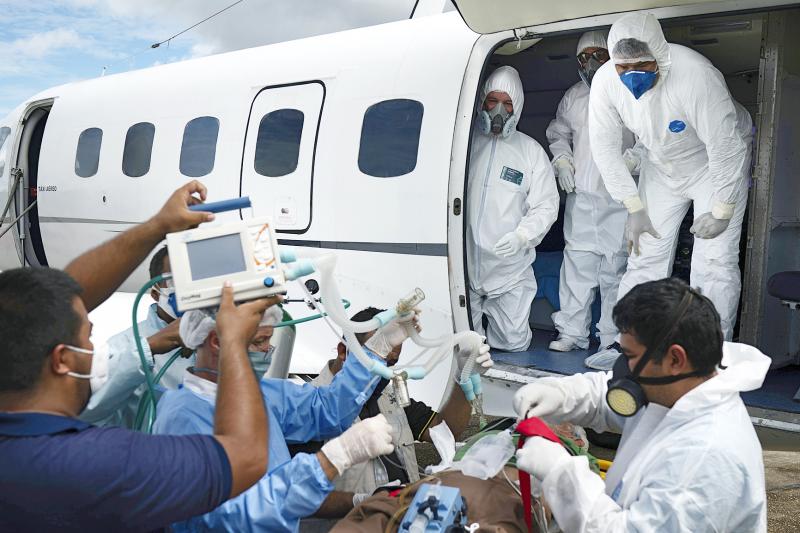Brazil on Tuesday registered 1,179 COVID-19 deaths in the previous 24 hours, the Brazilian Ministry of Health said, as the pandemic exacted its worst daily toll yet in the hardest-hit Latin American country.
This was the first time the daily toll exceeded 1,000.
New infections in the previous 24 hours totaled 17,408, bringing the total to 271,628, the third-highest in the world after the US and Russia.

Photo: AP
As of yesterday, the death toll stood at 17,983.
The pandemic appears to be gaining pace rapidly in Brazil, and experts say the peak there is not expected until early next month.
Public health experts also say that the government figures might grossly understate the death and infection tolls — perhaps by as many as 15 times or more — because Brazil carries out very little COVID-19 testing.
Brazil recently jumped three spots in 72 hours to take third place in the world in number of known infections, overtaking Britain, Spain and Italy.
Already, hospitals are close to the breaking point in some areas, including Sao Paulo, Rio de Janeiro and the northwestern state of Amazonas.
Brazilian President Jair Bolsonaro is in open conflict with most of the country’s 27 state governors as he downplays the virus and presses for the end of stay-at-home measures to rescue Latin America’s largest economy, which is now forecast to be headed for deep recession.
Bolsonaro announced that his interim health minister would yesterday issue a new treatment protocol expanding the use of the anti-malaria drug chloroquine to treat even mild cases of COVID-19.
Like US President Donald Trump, to whom he is often compared, Bolsonaro has hailed chloroquine as a potential wonder drug against the novel coronavirus, even though some studies have cast doubt on its effectiveness and safety.
Bolsonaro cited Trump’s own decision to take the related drug hydroxychloroquine preventively as evidence of its benefits.

The US government has signed defense cooperation agreements with Japan and the Philippines to boost the deterrence capabilities of countries in the first island chain, a report by the National Security Bureau (NSB) showed. The main countries on the first island chain include the two nations and Taiwan. The bureau is to present the report at a meeting of the legislature’s Foreign Affairs and National Defense Committee tomorrow. The US military has deployed Typhon missile systems to Japan’s Yamaguchi Prefecture and Zambales province in the Philippines during their joint military exercises. It has also installed NMESIS anti-ship systems in Japan’s Okinawa

‘WIN-WIN’: The Philippines, and central and eastern European countries are important potential drone cooperation partners, Minister of Foreign Affairs Lin Chia-lung said Minister of Foreign Affairs Lin Chia-lung (林佳龍) in an interview published yesterday confirmed that there are joint ventures between Taiwan and Poland in the drone industry. Lin made the remark in an exclusive interview with the Chinese-language Liberty Times (the Taipei Times’ sister paper). The government-backed Taiwan Excellence Drone International Business Opportunities Alliance and the Polish Chamber of Unmanned Systems on Wednesday last week signed a memorandum of understanding in Poland to develop a “non-China” supply chain for drones and work together on key technologies. Asked if Taiwan prioritized Poland among central and eastern European countries in drone collaboration, Lin

ON ALERT: Taiwan’s partners would issue warnings if China attempted to use Interpol to target Taiwanese, and the global body has mechanisms to prevent it, an official said China has stationed two to four people specializing in Taiwan affairs at its embassies in several democratic countries to monitor and harass Taiwanese, actions that the host nations would not tolerate, National Security Bureau (NSB) Director-General Tsai Ming-yen (蔡明彥) said yesterday. Tsai made the comments at a meeting of the legislature’s Foreign Affairs and National Defense Committee, which asked him and Minister of National Defense Wellington Koo (顧立雄) to report on potential conflicts in the Taiwan Strait and military preparedness. Democratic Progressive Party (DPP) Legislator Michelle Lin (林楚茵) expressed concern that Beijing has posted personnel from China’s Taiwan Affairs Office to its

BACK TO WORK? Prosecutors said they are considering filing an appeal, while the Hsinchu City Government said it has applied for Ann Kao’s reinstatement as mayor The High Court yesterday found suspended Hsinchu mayor Ann Kao (高虹安) not guilty of embezzling assistant fees, reducing her sentence to six months in prison commutable to a fine from seven years and four months. The verdict acquitted Kao of the corruption charge, but found her guilty of causing a public official to commit document forgery. The High Prosecutors’ Office said it is reviewing the ruling and considering whether to file an appeal. The Taipei District Court in July last year sentenced Kao to seven years and four months in prison, along with a four-year deprivation of civil rights, for contravening the Anti-Corruption